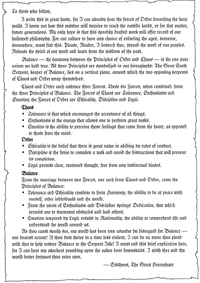
Short explanation of the system
The Ophidian Virtues is a virtue belief system used by the Ophidians of Serpent Isle. This philosophy is sometimes called the Way of Balance[1] and the Ethical Philosophy of Balance.[2]
History[]
This belief system is first found and explained in Ultima VII Part Two: Serpent Isle, though chronologically it was adopted by the Ophidians after the events of Ultima I. The Great Earth Serpent and its two sisters taught this system to the Ophidians. This belief system was the base of the Ophidian civilization. It was widely used in Serpent Isle until the rise of Exodus in Ultima III. With the abduction of the Great Earth Serpent and the wars that ensued, the Ophidian civilization was destroyed, and this system was abandoned, at least in Serpent Isle.
Explanation[]
Principles[]
The Ophidian belief system is formed around the following three Principles:
| Principle | Embodiment | Symbols |
|---|---|---|
| Order | Blue Serpent of Order | Diamond, Ice |
| Chaos | Red Serpent of Chaos | Ruby, Fire |
| Balance | Great Earth Serpent | Earth |
In the Ophidian symbology, the Great Earth Serpent is the keeper of Balance, and lies around "in a vertical plane"; the opposing serpents of Chaos and Order wrap themselves around the Great Earth Serpent, each spiralling in a different direction (a symbol inspired by Caduceus).
The whole Ophidian belief system is based on the Balance between Order and Chaos. Neither Order nor Chaos are enough; if any of them were left unchecked, destruction would ensue. This leads to Imbalance, the anti-principle of Balance.
The Forces and the Principles of Balance[]
The Forces are distinct aspects of the Order and Chaos principles. The Ophidian system comprises six Forces, three from Order and three from Chaos; the Forces of Order are Ethicality, Discipline and Logic, while the Forces of Chaos are Tolerance, Enthusiasm and Emotion.
Their descriptions are as follows:
| Force | Description | Symbols |
|---|---|---|
| Ethicality | The belief that there is great value in abiding by rules of conduct. | A torch |
| Discipline | The drive to complete a task and avoid the distractions that will prevent its completion. | A dagger |
| Logic | Clear, reasoned thought, free from any instinctual biases. | The abacus |
| Tolerance | That which encourages the acceptance of all things. | A chain |
| Enthusiasm | The energy that allows one to perform great tasks. | A rose |
| Emotion | The ability to perceive those feelings that come from the heart, as opposed to coming from the mind. | A heart |
The Forces are not equivalent to the Eight Virtues of Britannia, in that they are not goals by themselves. Each of the Forces has to be balanced by a Force of the opposing principle. When combined by pairs, these Forces form the three Principles of Balance (not to be confused with the three Principles of Order, Balance and Chaos above). Each of the three Principles of Balance is then what the followers of this system should strive to achieve.
The Principles of Balance, their descriptions and relations to the Forces of Order and Chaos are illustrated in the table below:
| Principle of Balance | Arises from | Description |
|---|---|---|
| Harmony | Ethicality and Tolerance | The ability to be at peace with the self, the individual and the world. |
| Dedication | Discipline and Enthusiasm | That which permits one to surmount obstacles and lead others. |
| Rationality | Logic and Emotion | The ability to comprehend life and understand the world around us. |
Anti-Forces[]
There also exists Anti-Forces associated to the Forces of Order and Balance. These Anti-Forces arise from Imbalance between the Forces, and are essentially perversions of their corresponding Forces. They can also be seen as each of the three Principles of Balance missing one of the two Forces composing them, therefore losing its Balance.
The Anti-Forces also manifest themselves as a kind of malevolent spiritual being, collectively called the Banes of Order and the Banes of Chaos.
The Anti-Forces (and Banes) are:
| Anti-Force | Arises from | Description |
|---|---|---|
| Prejudice | Ethicality without Tolerance | Disrespect for the beliefs and rights of others. |
| Apathy | Discipline without Enthusiasm | A spirit of hopelessness which retards positive action. |
| Ruthlessness | Logic without Emotion | Taking self-advancing actions without regard to the wants or needs of others. |
| Anarchy | Tolerance without Ethicality | A lack of standards of conduct. |
| Wantonness | Enthusiasm without Discipline | Acting without self-restraint. |
| Insanity | Emotion without Logic | An inability to overcome emotional impulses with rational thoughts. |
Summary[]
The following tables summarizes all the aspects mentioned above.
| Order Anti-Forces (unbalanced Forces) |
Order Forces | Balance Principle (combination of Forces) |
Chaos Forces | Chaos Anti-Forces (unbalanced Forces) |
|---|---|---|---|---|
| Prejudice | Ethicality | Harmony | Tolerance | Anarchy |
| Apathy | Discipline | Dedication | Enthusiasm | Wantonness |
| Ruthlessness | Logic | Rationality | Emotion | Insanity |
| Imbalance (Anti-Principle, lack of Balance) | ||||
Application of the system[]
The only known society that has applied this philosophy are the Ophidians of Serpent Isle. The virtue system used by the gargoyles has also the virtues of Balance and Order, the last one arising as the opposite of Chaos. However, unlike the Ophidian system, the gargoyle virtues are not based on a balance between opposites, but on three principles combining to form several virtues, much like the Eight Virtues of Britannia.
For details on the application on the system, see Ophidian society.
References[]
- ↑ Harashash. History of Serpent Isle (in-game). Ultima VII Part Two.
- ↑ Anonymous servant of Balance. Holy Books of the Ophidians (in-game). Ultima VII Part Two.